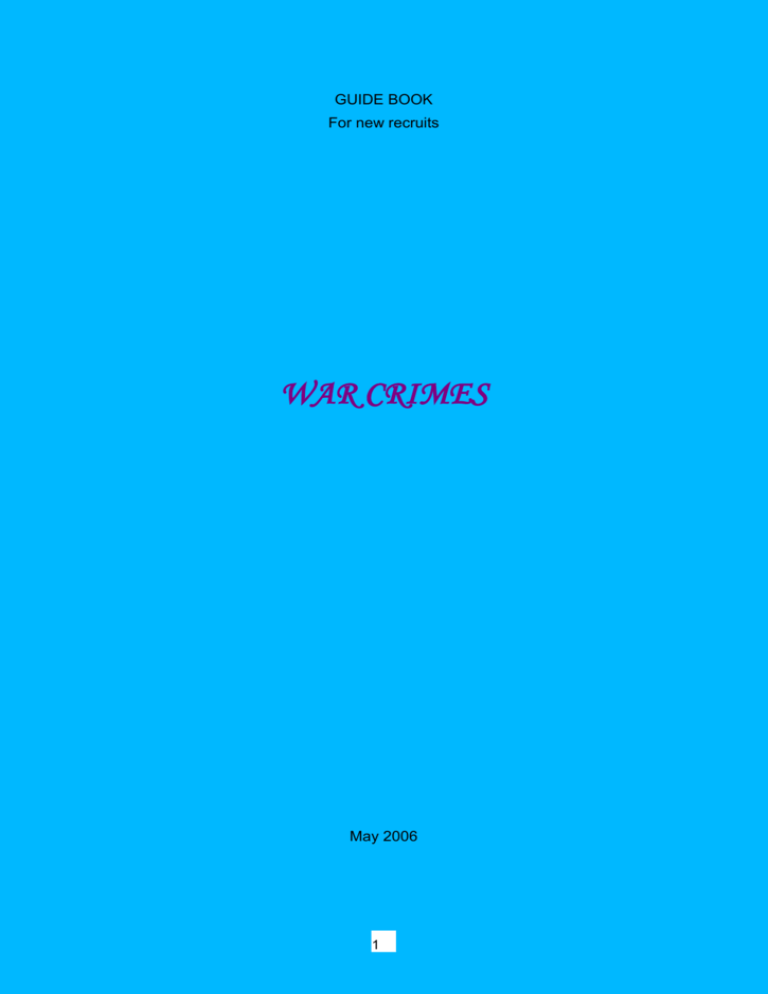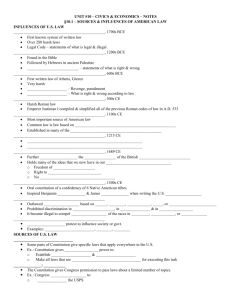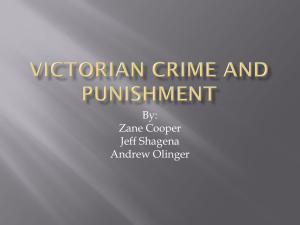Booklet On War Crimes
advertisement

GUIDE BOOK For new recruits WAR CRIMES May 2006 1 Maj. Gen. (Res.) Doron Almog hiding in an airplane on arrival in the UK to avoid arrest, charges filed in the US against Avi Dichter, (head of Israel’s Gen Security Service, ‘Shabak’) and those against Lt. Gen. (Res.) Moshe (Boogie) Yaalon (Israel’s retired Chief of General Staff) as well as the Army’s Chief Prosecutor’s recommendation to Brig. Gen. Avi Kochavi to avoid entering the UK - these incidents indicate that Israel’s Army officers and soldiers are no longer automatically immune from prosecution outside Israel. Initiation of legal proceedings abroad and the associated, justified, concern of many senior army officers over travel to Europe and the US, are only one aspect of the issue. The other aspect is what are you going to do in such a case. REFUSING TO CLOSE EYES Our ‘temporary’ occupation of the territories has been going on now for nearly 40 years and the harsh repression of Palestinians in the territories continues under the guise of our disengagement from the Gaza Strip and the relative lull in the armed struggle. Millions of Palestinians in the occupied territories, unable to move from place to place, are subject to the caprice of the occupying army and ruthless settlers. In the West Bank there are now new generations of Palestinians who have never in their lifetimes experienced normal human rights or even a free day. War crimes continue to take place incessantly in the territories and Israeli settlements continue to expand. ALL THAT’S BEING DONE IN OUR NAME Not only does the occupation hurt Palestinians; it morally destroys us and our fellow citizens in Israeli society It erodes social solidarity ties and harms particularly the weaker sectors of our society. Funds required to strengthen these sectors are invested instead in extension of the occupation. INTERNATIONAL WAR LAW Contrary to common belief, wars and armed campaigns in general take place within a legal framework specifying rules of engagement and limits of permissible actions in battlefields. Nations uphold International Law by means of international covenants and customs. It sets limits on the use of military force and specifies which actions are considered ‘legal’ and which are not. The Army (of every nation that has ratified the International Law Codex), its officer corps and combatants, are subject to International Law and obligated to abide thereby. International Military Law (also known as ‘International Humanitarian Law’) deals with a variety of combat situations and associated problems. For example: a The conditions under which a state (or combat force) is allowed to use force; what are ‘attackable’ targets, what targets should be immune from 2 attack, what types of armament are legitimate and which not; how enemy combatants are to be treated and how civilians in occupied areas are to be treated. International War Law addresses each of these issues and the Law has to be obeyed by army commanders and soldiers. If not, they risk committing war crimes. THE PRINCIPLES OF DISTINCTION AND OF PROPORTIONALITY Two prime principles included in International War Law are the ‘Principle of Distinction’ and the ‘Principle of Proportionality’. The ‘Principle of Distinction’ defines the obligation to distinguish between combatants (who are considered legitimate, attackable, targets) and civilians that are not legitimate targets. Attacking the latter is a war crime, except if the attack is carried out for self-defense. The same principle also distinguishes between military installations (e.g. military bases, arms-manufacturing installations, ammunition dumps, etc.) and civilian installations (e.g. schools, hospitals, government offices, etc.), prohibiting attacks against the latter. The Principle of Distinction requires anyone engaged directly or indirectly in combat (Army officers and soldiers, and civilians issuing orders to military commanders) to distinguish between combatants and civilians. The ‘Principle of Proportionality’ states that an attack against any ‘legitimate’ target (as defined above) may still be considered illegitimate, and prohibited, if the attack might result in disproportionate damages to non-legitimate targets. For example, bombing a school to hit an adversary combatant hiding there would clearly be disproportionate and forbidden as it would threaten the lives of children in that school. Similarly, using a one-ton bomb to hit one adversary combatant in a residential building in a densely built-up area is disproportionate and prohibited because it would result in massive civilian casualties. The ’ Principle of Proportionality’ requires that in order to qualify as a ‘legitimate’ military action, military advantage(s) of the action must outweigh damages incurred by civilians Based on this principle, International Law imposed restrictions on the use of armaments. For example: the use of ‘firecracker’ artillery shells (exploding above ground and spreading exploding steel balls) and of ‘flanchette’ artillery shells (that effectively kill anyone within a specified radius) are forbidden because these weapons can not be aimed accurately enough to avoid hitting uninvolved civilians. INTERNATIONAL CRIMINAL LAW An international legal process that eventually led to codification of an International Criminal Law and the establishment of legal institutions that would try and punish international criminals, commenced pursuant to an assessment of the huge numbers of military and civilian casualties caused by World War One (WWI). The process was intensified after WWII, upon 3 discovering the extent of atrocities committed by Nazis on even larger numbers of civilians in occupied areas. The resultant international law addresses several crimes such as crimes against humanity and genocide. Combatants that violate international war laws are war criminals. Two types of courts were authorized to try international criminals: international courts, and national courts. International courts are those established by international organizations, such as the UN. Accordingly, two international courts were established in the 1990s to try war criminals in states separated from Yugoslavia (Serbia, Croatia), and those who committed genocide in Rwanda. These courts, which are still functioning, are not part of any national court system. Its judges hail from various countries and are appointed by, and function under, the auspices of the UN. An International Criminal Court (ICC) was established in 1998 under the Rome Convention. Unlike the two other international courts whose terms restricted their jurisdiction to ex Yugoslavia and Rwanda respectively, the ICC’s jurisdiction is unlimited. The court is currently located at The Hague. National courts have been authorized, and even required, to try international criminals in order to avoid their respective countries being used as havens. Several Western European countries have already amended their laws accordingly, authorizing their courts to try suspected war criminals and those suspected of crimes against humanity, even though the suspects may not have been citizens of these countries and the suspected crimes had not necessarily been committed within their territories. Thus, despite the fact that there is no direct linkage between a country and suspected/committed crimes, the country’s courts are authorized to try the cases because such crimes are considered crimes against humanity as a whole. Consequently an Argentinean, suspected of having committed crimes against humanity in Argentina, may be tried in Spain, while a suspect of committing genocide in Rwanda may be tried in Belgium. For the same reason, an Israeli, suspected of having committed war crimes, may be tried in the UK, France or elsewhere. Violation of International Humanitarian Law may be considered a war crime. Any soldier serving in the IDF, like a soldier serving in the Armed Forces of any other country, has to obey International Law. Otherwise, his actions, in addition to being morally shameful, may incriminate him in war crimes and lead to his trial by national courts in other countries or by international courts. OCCUPATION REGULATIONS Occupation regulations constitute a branch of combat regulations within a broader field of international war regulations, which control actions of armed forces within occupied areas. Occupation regulations provide specific protection against assault upon civilians under occupation of a foreign army and impose numerous obligations upon occupying armed forces. These armed forces are obligated, inter alia, to protect the lives, dignity and well- 4 being of the occupied population. The occupying armed forces are forbidden to damage or destroy property, homes or land belonging to the occupied population, except in rare cases when damage or destruction of property is unavoidable due to military needs. In any case confiscation of property is forbidden. In other words, occupying armed forces are responsible for the protection of the occupied population and its basic rights. WHAT, THEN, IS ALLOWED AND WHAT IS FORBIDDEN In this booklet we cannot describe all acts prohibited under International Law, and, likewise, we cannot examine and comment on every possible military action the army may take or every military policy the army may impose. However, every soldier serving in a civilian area is obligated to refrain from assaulting civilians, even if they are not citizens of his country. During occupation, soldiers are obligated to protect civilians and ensure their safety. Most existing war regulations are included in the 1907 Hague Convention on Land Warfare, and in the 1949 Fourth Geneva Convention concerning protection of civilians during warfare. The conventions may be viewed on ‘Yesh Gvul’s’ website. www.yeshgvul.org MILITARY SERVICE IN THE OCCUPIED TERRITORIES? The most democratic action today is to refuse to take part in repressing others and committing crimes against humanity, because such refusal would deny the State the possibility of committing explicit undemocratic acts. Because refusal can potentially influence decision makers, it is a conscientious step with clear political implications. There are numerous testimonies to the fact that during the past years, growing waves of resistance to participation in oppressive acts in the occupied territories influenced Sharon’s decision to withdraw from Gaza (e.g. Sharon’s advisor Dov Weisglass’ statement in an interview to ‘Haaretz’ on Oct.8, 2004). To refuse to take part in war crimes and oppression is more relevant now than ever. It does, however, imply conscientious and social discipline. Keep in mind that an increase in the number of people refusing to participate in the occupation will accelerate our withdrawal from Itamar, Yitzhar and Ariel, and the removal of Kahana disciples from Hebron and Kiryat Arba. Several thousand recruits, inductees, regular and reserve male and female soldiers have refused to participate in oppressing the population of the occupied territories during the past years. We will continue supporting all citizens refusing to take part in the occupation, some of whom are paying dearly for their conscientious refusal by being jailed. You have to decide whether or not to refuse, and the decision has to be taken by each and every one individually. Should you however decide to refuse serving the occupation, you will find our support, advice and assistance. 5 Our HOT LINE for inductees and soldiers: 02- 625- 0271 To contact us, for additional information on war crimes, for details of various activities, for signing a petition on refusing to serve and for donations, enter our website at www.yeshgvul.org.il Yesh Gvul, P.O.Box 6953, Jerusalem 91068 IT IS IN OUR POWER TO END THE OCCUPATION ! 6





